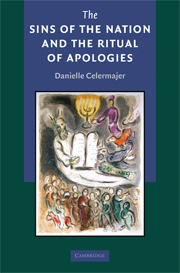Book contents
- Frontmatter
- Contents
- Acknowledgements
- Introduction: The Apology and Political Theory
- 1 The Apology Phenomenon
- 2 Apologies as Speech Acts
- 3 Judaism's Apology: Reconstituting the Community
- 4 The Privatization of Repentance in Christianity
- 5 Australia's Divided History
- 6 Saying Sorry in Australia
- 7 Apology's Responsibility
- 8 Apology as Political Action
- Bibliography
- Index
3 - Judaism's Apology: Reconstituting the Community
Published online by Cambridge University Press: 27 July 2009
- Frontmatter
- Contents
- Acknowledgements
- Introduction: The Apology and Political Theory
- 1 The Apology Phenomenon
- 2 Apologies as Speech Acts
- 3 Judaism's Apology: Reconstituting the Community
- 4 The Privatization of Repentance in Christianity
- 5 Australia's Divided History
- 6 Saying Sorry in Australia
- 7 Apology's Responsibility
- 8 Apology as Political Action
- Bibliography
- Index
Summary
Sin is the breaking off of a personal relationship with God. It presupposes the experience of a vis-à-vis whose holiness has been discovered in a retrospective act of reflection and repentance…. [T]he idea of sin is the obverse of the idea of God.
Albert GelinAN ALTERNATIVE TEMPLATE FOR APOLOGY?
If the dominant images of apology cause us to stumble on the idea that an apology can be genuinely collective, then the Jewish practice of teshuvah, or repentance, may well provide the alternative trope we need to rethink contemporary collective apologies. As against the inherited metaphor of apology as an essentially individual event, whose heart lies in an internal process of regret, in Judaism one finds an apologetic form that is essentially public, spoken, and collective. In fact, the collective quality of the practices and theological understandings of teshuvah cannot, without gross distortion, be reformulated in terms of the individual ‘repentance of the lone heart’ model. On the contrary, the Jewish tradition privileges the constructive role of collective symbolic action and speech and encodes it as part of a suite of reparative acts that work in concert to effect not only individual but, more importantly, collective transformation. This latter, political dimension of Judaism's apology is particularly pertinent for our purposes, because here we seem to have a model for the work that apology can do in reconstituting the identity of a community as a political entity.
- Type
- Chapter
- Information
- The Sins of the Nation and the Ritual of Apologies , pp. 65 - 107Publisher: Cambridge University PressPrint publication year: 2009



